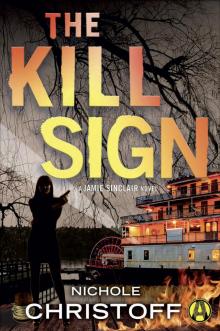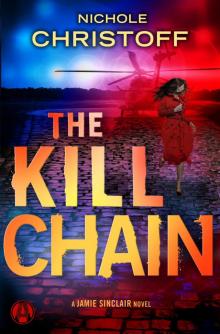- Home
- Nichole Christoff
The Kill Chain Page 20
The Kill Chain Read online
Page 20
“Think I could sweet-talk you into checking this VIN for me?”
“That could be arranged,” he said, rising to his feet. “Of course, if I run it, McIlvoy could find out about it.”
That wouldn’t do.
But then I remembered I had a friend as interested in unraveling this business as I was.
I glanced at the Roadster on my wrist. The hour was late and getting later. But Nathan Rappaport had always answered when I called. Of course, what we had to discuss was too sensitive for cellphones, but maybe that was all right. I knew where Rappaport lived.
Chapter 32
Nathan Rappaport answered his door wearing nothing more than his bathrobe. Somehow, I got the vague impression that he’d been in bed. And from the way he blushed a dangerous shade of crimson, I had to say he looked rather surprised to see me.
“I’m sorry for stopping by like this.” Standing in Rappaport’s poppy-covered hallway with Barrett at my side, I rushed to apologize. “Dropping by seemed like a good idea.”
“No, no,” Rappaport assured us. He waved us inside. “It’s fine. You can come by anytime.”
I hooked a thumb at Barrett, tried to introduce him.
“This is—”
“The army type.”
Rappaport smiled, shuttled us to his sofa.
“I saw you once,” he told Barrett. “With Jamie. At one of her father’s fundraisers.”
Before the men could shake hands, a rustling in the hallway drew our attention. A dark-eyed beauty with mussed hair emerged from Rappaport’s bedroom. Clutching her shoes and a silly little purse in one hand, she struggled to zip up the back of her rumpled sheath dress with the other.
Rappaport tried to put on his party manners. “Oh, this is Shelly—”
“Sheila.”
“Right. She’s the Life and Culture columnist for the Washington Post—”
“Washingtonian.”
“Sure. We met earlier this evening.”
If Sheila’s look could kill, Rappaport would’ve been dead.
The wretched man, however, blundered on.
“She was just leaving,” he said.
“I was just leaving,” she agreed.
Smiling tightly at me and rolling her eyes at Rappaport, she did.
“I really am sorry,” I said when the door had clicked shut behind her. “We didn’t mean to interrupt your evening.”
I glanced at Barrett for confirmation. A muscle in his jaw jumped with the effort of keeping his mouth shut. Because if he opened it, he’d laugh.
“No, really, it’s fine.” Rappaport insisted we sit. “I’ll go put on some—I’ll be right back.”
When he disappeared up the hall, Barrett said, “You know his pants are probably hanging from the ceiling fan in his bedroom, right?”
I elbowed Barrett in the ribs. And Rappaport, now wearing trousers and a wrinkled dress shirt, chose that moment to return. I gave him the VIN from the Corolla that had been parked behind Fraley’s house, asked him if he could help me identify its owner.
“Be glad to,” he said. “First thing in the morning. By the way, this came tonight.”
He snagged a manila envelope from his breakfast bar, handed it to me. Inside, I found a letter. I read it while Barrett excused himself to take a call on his cell.
“This is notice of a restraining order,” I said, “filed by the chairman of the FCC.”
“Mitchell Farnsworth applied for it himself,” Rappaport replied.
“A judge signed it this afternoon. It bars you from coming closer to Farnsworth than five hundred feet.”
“Yes, it does.”
“This is ridiculous.”
“Yes, it is.” Rappaport flopped onto the other end of the sofa. He crossed one ankle over the other. “Jamie, how far would you say it was from our table at the Saint George to Farnsworth’s?”
I tossed the letter onto the coffee table. “I’d say it was too close for comfort—especially for Senator Einhorn.”
Einhorn had to be behind this. Just as he had to be behind Kenneth Jones’s mad dash back to the library’s Dumpster and McIlvoy’s raid on my father’s house. I’d upset the senator’s applecart when I’d shown him Jones’s picture this afternoon—and when I’d intimated he’d planted the false story about me at Fairfax Fifty-five. Now, it seemed, he wanted to spook the journalist who’d helped me spot him at the Saint George.
But I couldn’t connect Einhorn to Madeline Donahue, Fraley, or Pruitt. He wasn’t in a position to pass along valuable government contracts to corporations like Stellar Unlimited, where the lives of the other three had crossed. No, Einhorn only seemed to want to defeat my father for the party’s presidential nomination.
Yet Madeline seemed in on that, too. A key to my father’s house had been messengered to her. And she’d sought me out, apparently hell-bent on drawing me into a federal crime with the black-market sale of the stolen CubeSat.
I just couldn’t put all these disparate pieces together. Until I did, I was in danger of going to jail for a crime I didn’t commit. And those close to me were in more danger than that. Someone had sent those amateur gunmen through my father’s gate tonight. Someone viewed me as the weak link in their kill chain.
I just didn’t know who.
Frustrated, I got up to pace the room.
“Hey.” Rappaport fell into step beside me. “It’s okay. We’ll get to the bottom of this. And you have an open invitation to sleep on my sofa anytime you need.”
“Like tonight?” Barrett asked, stepping from the kitchen.
He’d finished his phone call, but he didn’t look happy about it.
“I have to go,” he explained. “McIlvoy’s steamed. He hasn’t accused me of failing to detain you, but he’s making noises about undue influence from senators and kicking all army personnel off the task force.”
“Can he do that?” I asked.
“No, and he knows it.”
“Jamie’s more than welcome to stay here,” Rappaport assured him.
“Thanks, but no,” I said. “Senator Einhorn has connected me to you. You don’t need to be raided by the FBI tonight.”
“Einhorn’s done enough damage for one day.” Rappaport jerked a nod at the restraining order notice lying on the table. “He moved mountains through Farnsworth, a municipal court judge, and from the sounds of things, the FBI. The old buzzard’s probably at home, asleep in his recliner by now.”
I said, “Buzzards don’t have recliners.”
Rappaport grinned. But he’d convinced me. He went off to fetch some blankets.
In Rappaport’s absence, Barrett said, “Honey, don’t let him offer to show you his ceiling fan.”
“He won’t,” I replied. And I wouldn’t want to see it anyway. “Poor Sheila.”
“And Shelly.”
I stood on tiptoe, brushed a quick kiss across Barrett’s lips.
“Yep,” I murmured. “Her, too.”
Chapter 33
Bright and early the next morning, Rappaport called up one of his own contacts at the Department of Motor Vehicles. While he made our request, I paced through the sun motes floating in from his sliding glass door. When he read off the VIN, I held my breath.
“Yes,” he said into his phone. With rapid-fire fingers, he typed notes onto his laptop, propped on his coffee table. “Yes, it’s a Toyota Corolla…Well, that’s interesting…Thanks, Carla.”
Rappaport disconnected. He typed a few moments more. And then he turned to me, triumphant.
“This car had been totaled,” he announced, “donated to public radio, and then sold for scrap to a junkyard in Maryland.”
I halted in the streaming sunlight. “Then how did it get back on the road?”
“Hobbyists and car guys cruise scrap yards all the time
, looking for possible rat rods, parts, and restoration projects. Someone bought this Corolla, fixed it up, and got it inspected. The car received a Rebuilt Salvage title.”
“Rebuilt Salvage. That’s a new one for me,” I admitted.
“A number of US states issue Rebuilt Salvage titles,” Rappaport explained. “Vehicles that have been wrecked, or otherwise ruined, and are declared totaled by insurance adjusters can continue to be bought and sold on a Salvage title—”
“But restored cars are designated Rebuilt Salvage so future buyers are aware it was once junked?”
Rappaport beamed at me. “Exactly. After the owner earned the Rebuilt Salvage title, he registered the vehicle. I got his name, Jamie.”
“Dylan Pruitt,” I guessed.
“Bingo. And after tooling around in it for a couple of years, he sold it last fall. A woman bought it.”
“Madeline Donahue?”
“No,” Rappaport said. “The car is currently registered to a Sarah McDermid.”
Sarah McDermid.
Madeline Donahue.
Could they be one and the same?
“Do you have this Sarah McDermid’s address?” I asked.
“Yep.”
Rappaport propped his elbows on his knees and leaned in like he had something significant to say.
And that’s when I knew he wanted to tell me something I might not want to hear.
“When I bumped into you at the Patriot’s Cup, I mentioned we initially met at one of your father’s fundraisers,” he said. “Well, I’ve been covering him for years. And the name Sarah McDermid rang a bell for me.”
I rounded the sofa, sat down beside him.
“We could ask Sheila to go through the Washingtonian’s archived society pages,” he said, angling his laptop so I could see the screen, “but this is your father at a fundraiser at the Willard nearly four years ago. That’s his date on his arm. That’s Sarah McDermid.”
The woman in the sweeping fuchsia satin gown, with her mitt slipped through the crook of my father’s tuxedo sleeve, wore her hair in a smart bob, dyed a dimensional black at a superior salon. Her makeup was tastefully tailored to the occasion. Still, it made the most of what she had. She was a few years older than me, though not many. And regardless of what her true name might be, in my office last Thursday she’d called herself Dr. Madeline Donahue.
“Well, well,” I said. “Whoever she is, I think we should pay her a visit.”
Rappaport agreed.
And he drove.
Sarah McDermid, it turned out, had registered the Toyota Corolla in question in the beautiful state of Maryland—just as Dylan Pruitt had done before her. As Rappaport and I zoomed around the Capital Beltway, past the curve where the sun set the six fine golden spires of the Latter-day Saints’ Washington, DC, temple to sparkling, I posited that maybe Sarah—or Madeline, as she was known at the government lab nearby—had bought Pruitt’s car just to get to know the young soldier connected with CubeSat security. And once she knew him, she recruited him to break with procedure and enable her to run off with the prototype.
That this Sarah had continued living at the same address now that she’d gone to ground felt like a long shot. But maybe she believed her alias would shield her. After all, so far, no one had been able to locate Madeline Donahue. Not McIlvoy with the FBI to back him up, not Barrett and his army investigator’s training, not Niilo with his wealth and will, and certainly not little ol’ me. Nope, it had taken a newspaperman’s diligence to uncover her dual identities.
That newspaperman and I exited the Beltway, driving through rolling green hills that undulated on either side of the wide roadway. In the distance, I caught a glimpse of razor wire, silver in the sunshine. And I knew we’d passed one of those mysterious government labs the human lie detectors at the Pentagon had questioned me about.
Small towns sprung up in the hollows. Some were older than our nation. Others had been fabricated for folks with more money than sense. Here and there, farmsteads still existed, too. Humble ones of plank or logs, and gorgeous manor houses of brick or fieldstone had survived at least a couple hundred years of war, westward winds, and weathering.
In some instances, these homes belonged to Maryland families. But a variety of governments owned some, too. And even Camp David, the presidential retreat, was out this way. So it should’ve struck me as entirely natural when Sarah McDermid’s address turned out to match one of the more magnificent homes. But it didn’t.
On a country road that wove between clover-filled meadows hemmed in by woods and split-rail fences, Rappaport and I found Sarah McDermid’s supposed abode. We both gaped as we cruised past to see the bluestone manse, tucked in a private valley. A brook burbled along the east side of the house. A gazebo peeked from the corner of the west. And in the vast paddock out front, curried thoroughbreds grazed.
“It’s a horse farm!” I exclaimed.
A gold-leaf-embellished sign, set alongside the gravel drive and surrounded by a bed of purple pansies, proclaimed as much: Daisy Chain Stables. Behind the house, red barns rose. Corrals circled close. More meadows stretched off in the distance, and on a hillock, in a small stand of trees, a cellphone tower speared into the clear, blue sky.
“Whoever she really is,” Rappaport said, frowning, “she can’t own this place, can she? I mean, that’s a multimillion-dollar property.”
I’d been in a few of the multimillion-dollar properties around here—and in Virginia and Delaware, too. Just last month, at the request of a client considering purchasing one, I’d swept three such properties for electronic listening devices. Because here, so near our nation’s capital, these properties sometimes served as listening posts for governments that might want to engage in some old-school spying.
Said governments buy such houses, retrofit them with sophisticated equipment, and staff them with diplomats and delegates. From the outside, these homes appear to be private retreats or recreational clubs. But on the inside, they’re all business, surveying, identifying, and monitoring certain communications—or even individual American citizens.
If, on rare occasion, the goings-on at one of these establishments make it into the news, bands of my fellow Americans might decry their existence and lament that our government doesn’t shame these nations, seize their facilities, and shut ’em down. But the beauty of appearing to turn a blind eye and a deaf ear to this kind of activity means that our counterintelligence services know where, when, and on whom to keep tabs. After all, sometimes it was best to keep your friends close and your enemies closer.
“Well, one thing’s for sure,” I told Rappaport. “They’re not going to let us roll up and say, ‘Howdy do. May we chat with Sarah?’ ”
The bluestone house was surrounded by an emerald-green lawn. Flowering shrubs produced a cavalcade of color. But surrounding this nest of domesticity was a delicate iron fence. And while it appeared to be merely decorative, or maybe meant to keep grazing horses in their meadows and out of the garden, that fence was absolutely, positively a security measure.
Rappaport drove on into the next little town.
There, he turned around and we bypassed Daisy Chain Stables again.
“Think they know we’re snooping?” he asked.
“Undoubtedly.”
Nonetheless, we repeated our drive-by process all afternoon.
And at no time did we see the crummy Corolla, Madeline/Sarah, or anybody else besides the horses.
Chapter 34
Maryland’s western sky turned every color of the rainbow as the late-day sun dipped toward the far horizon. I took a moment from watching the bluestone house to admire the view from the passenger’s seat of Rappaport’s car. He and I had managed to find a gravel road, haring through the hills that folded against the Daisy Chain Stables. Along the way, we’d come across a dirt drive made for farmers’ tra
ctors turning into a fallow field. There, we parked. And below a rise, and around the bend, stood the expansive home—no bigger than a shoe box at this distance—and its barns and meadows.
No one had come and no one had gone from the property on our watch.
And, as a result, I was just about ready to call it a night.
On the ridge above the place, even the starry white lights along the scaffolding of the tall cellphone tower ignited to signal the end of the day. At the tower’s top, where elongated antennae and round microwave transmitters ringed it like a crown of thorns, a red light began to shine like a Cyclops’s eye. Altogether, the lights were a cheery counterpoint to the coming dark, even if they were meant to warn planes to stay away.
Not everyone avoided the tower, however.
Headlights pushed through the woods meandering across the hilltop. I shoved my glasses higher on my nose just as a plain white panel van emerged from the forest. It pitched and bumped along the access road, halted by a small powerhouse at the base of the tower.
To my way of thinking, it seemed awfully late in the day for a repair crew to take on a job. But what did I know? Crews often worked all day and all night to keep our communications grid going.
But then a solitary figure emerged from the bluestone house. He or she headed toward the tower. And the van.
“Do you see what I see?” Rappaport asked.
I did. The person from the house wandered up the slope as if out for nothing more eventful than an evening stroll. And suddenly, I was seized with the urge to do the same.
“How’re your skills in the woods?” I asked Rappaport.
“Well, I grew up in Baltimore—”
“Ah. The sportsman’s outdoor paradise.”
“I’m not sure the city’s tourist board will ever adopt that slogan.”
“That’s all right. In the meantime, think we can find a road that’ll get me closer to that stand of trees?”

 The Kill Wire
The Kill Wire The Kill Box
The Kill Box The Kill Radius
The Kill Radius The Kill Shot
The Kill Shot The Kill Chain
The Kill Chain The Kill List
The Kill List